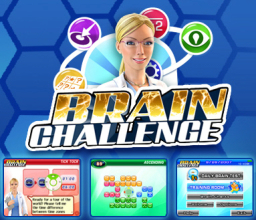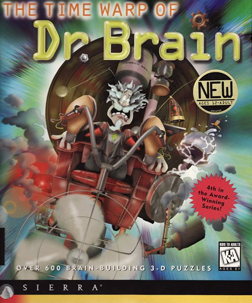 W
WBest of Tests DS is an educational video game released for Nintendo DS in North America on March 4, 2008. The game intends to present tests and puzzles that will help stimulate one's Intelligent Quotient or "IQ" through five categories: logic, observation, memory, speed of perception and analysis. The game contains three gaming modes: Training, Memory and Tests. Best of Tests DS calculates the player's IQ and adapts the difficulty level in order to provide a personalized challenge that is always renewed and updated.
 W
WBig Brain Academy is a puzzle video game published and developed by Nintendo for the Nintendo DS handheld video game console. It was released in Japan on June 30, 2005, and in North America on June 5, 2006, in Australia on July 5, 2006, and in Europe on July 7, 2006. The game was planned to be released in China for the iQue DS system, and appeared in the system's trailer, but this release was cancelled for unknown reasons. It has been compared to Brain Age: Train Your Brain in Minutes a Day!. It is marketed under Nintendo's Touch! Generations brand. A sequel, Big Brain Academy: Wii Degree, was released on the Wii in April 2007.
 W
WBody and Brain Connection, also known as Dr. Kawashima's Body and Brain Exercises in PAL regions, is an puzzle video game developed and published by Namco Bandai Games for the Xbox 360's Kinect platform. It was released in Japan on November 20, 2010, in North America on February 8, 2011, and in Europe on February 11, 2011.
 W
WBrain Age: Train Your Brain in Minutes a Day!, also known as Dr. Kawashima's Brain Training: How Old Is Your Brain? in PAL regions, and Daily DS Brain Training in South Korea, is an entertainment puzzle video game. It was developed and published by Nintendo for the Nintendo DS. Nintendo has stated that it is an entertainment product 'inspired' by Ryuta Kawashima's work in the neurosciences.
 W
WBrain Age 2: More Training in Minutes a Day!, also known as More Brain Training from Dr Kawashima: How Old Is Your Brain? in PAL regions, is an edutainment puzzle game and the sequel to Brain Age: Train Your Brain in Minutes a Day! (2005). It was published and developed by Nintendo for the Nintendo DS handheld game console. Before the game begins, the player must perform a Brain Age Check to determine their brain age, which ranges from 20 to 80, to determine approximately their brain's responsiveness. A brain age of 20, the lowest age that the player can achieve, indicates that the player's brain is as responsive as that of an average 20-year-old. After the player is told their initial brain age, they can complete a series of minigames to help improve their brain's responsiveness, after which they can run Brain Age Check again to determine their updated brain age.
 W
WBrain Age Express are three educational puzzle video games developed by Nintendo for the Nintendo DSi's DSiWare download service. They are the third series of games in the Brain Age series, and are repackaged versions of both Brain Age: Train Your Brain in Minutes a Day! and Brain Age 2: More Training in Minutes a Day! games, featuring both old and new puzzles.
 W
WBrain Age: Concentration Training, known in Europe and Australia as Dr Kawashima's Devilish Brain Training: Can you stay focused?, is an educational puzzle video game developed and published by Nintendo. It is the fourth major entry in the Brain Age series and the first made specifically for the Nintendo 3DS. It was released in Japan on July 28, 2012, and in North America on February 10, 2013. It later came to Europe on July 28, 2017, and Australia on July 29, 2017, five years apart from the initial release. Dr. Kawashima presents the game's purpose as being to counter prevalent subpar concentration skills onset by social media and other aspects of modern life.
 W
WBrain Assist or Touch de Uno DS is a puzzle video game released for Nintendo DS in Japan, North America, and the PAL region. Studies in the 1960s demonstrated the lateralization of brain function. The left-brain hemisphere deals with sequential analysis - reasoning using language, mathematics, abstraction and reasoning. Memory is primarily stored in a language format. The right-brain hemisphere deals with auditory, visual, and spatial concepts dancing and gymnastics, which is what the game aims to stimulate in the player.
 W
WBrain Boost, also known as The Professor's Brain Trainer in Australia and Europe, is a series of three brain-training games developed by Interchannel for the Nintendo DS handheld game console. Brain Boost was originally released in 2005 in Japan. Majesco Entertainment published the first two games in the series in the United States on November 17, 2006, the third game on January 22, 2008. Each game consists of five related mini-games.
 W
WBrain Challenge is a mental exercise video game, featuring "brain exercise puzzles". The game was developed by Gameloft Beijing for mobile phones and iPods and released on September 5, 2007. It was followed by a Nintendo DS version on January 8, 2008, an Xbox Live Arcade release on March 12, 2008, and a PlayStation 3 launch on November 27, 2008. The N-Gage 2.0 version was released on the day of the service's launch, April 3, 2008. A version for WiiWare was released in Japan on October 14, 2008, in Europe on November 7, 2008 and in North America on November 10, 2008. The Wii version also uses Miis for the players profile. OnLive also had launched their new streaming game platform with Brain Challenge on July 27, 2010. On January 20, 2011, the game was released for Mac OS X.
 W
WDr Kawashima's Brain Training for Nintendo Switch, also known as Nintendo Switch Brain Training for Adults in Japan, is the fifth entry in the Brain Age puzzle video game series, based on the research of neuroscientist Ryuta Kawashima, whose avatar guides the player through the game. It was co-developed by Nintendo EPD and indieszero, and published by Nintendo for Nintendo Switch. It was released on December 27, 2019 in Japan, and January 3, 2020 in Europe and Australia.
 W
WMind Quiz, also known as Mind Quiz: Exercise Your Brain or Mind Quiz: Your Brain Coach, is a mental training game for the Nintendo DS and PlayStation Portable. It is similar to Nintendo's Brain Age: Train Your Brain in Minutes a Day! It involves playing different training exercises to measure and improve particular parts of the player's brain, such as one's brain age and its brain stress degree.
 W
WMinDStorm, known in Japan as Akiyama Jin Kyouju Kanshuu: Zennou JinJin , is an educational video game published and developed by ASK for the Nintendo DS video game console. It was first released in Japan on September 1, 2006, and was released on May 4, 2007 in Europe. MinDStorm was released under the name "Master Jin Jin's IQ Challenge" in North America and was released on October 8, 2007.
 W
WThe Moron Test is a mobile brain teasing game developed and published by American studio DistinctDev, Inc. for the iOS and Android platforms, and is one of the best selling iPhone applications of all-time. The Moron Test was initially released on April 20, 2009 for iOS and was released for Android on May 13, 2010. Its format is inspired by IQ tests that pose seemingly simple questions in order to extrapolate broad indices of intelligence. Upon its initial release on iTunes, The Moron Test became the #1 top selling app in the U.S. App Store. The app has repeatedly reached a Top 10 Overall ranking and has been in the Top 100 Overall apps for over 450 consecutive days in the US App Store. On September 10, 2010, DistinctDev released The Moron Test: Section 1, a free version of the game on iOS, offering the "Old School" section. Two months after the Android platform launch, the free version received more than 700,000 downloads, the paid version became the 9th most downloaded paid game with over 65,000 downloads on the Android market. The Moron Test has seven sections: Old School, Late Registration, Winter Break, Food Fight, Skip Day, Tricky Treat, and Ooga School. The latest iOS version of includes an in-app purchase for the Extra Credit section, Flying Colors.
 W
WProfessor Brainium's Games is an educational video game by Polish developer Frontline Studios released exclusively for the Nintendo DS in 2008. The purpose of the game is to inform the player by providing various puzzles, which they must complete to progress further. The game is similar to Brain Age and Big Brain Academy in its format and style of play.
 W
WProfessor Kageyama's Maths Training: The Hundred Cell Calculation Method is a puzzle video game published by Nintendo and developed by Jupiter for the Nintendo DS handheld video game console. It was first released in Japan, and was later released in Europe and Australasia. It was released in North America as Personal Trainer: Math on January 12, 2009. It was also released in South Korea in 2009. The game is part of both the Touch! Generations and Personal Trainer series. The game received mixed reviews, with common criticisms cited for the game's difficulty in recognizing some numbers and for not being very entertaining to play. At GameRankings, it holds an average review score of 65%.
 W
WThe Time Warp of Dr. Brain is the fourth installment of the educational game series Dr. Brain by Sierra On-Line. The game's structure is similar to its predecessor, The Lost Mind of Dr. Brain: the player must complete several puzzles which appeal to a specific part of the brain; however, this game also adds a time-period based theme to each puzzle and the game's theme overall is time travel.